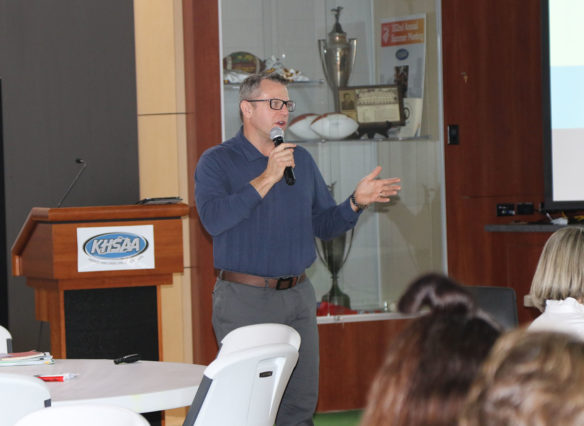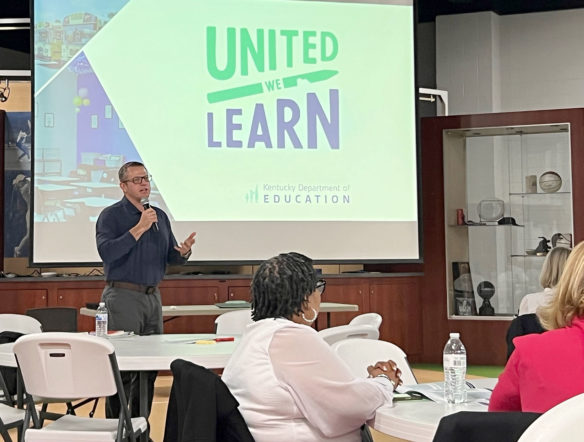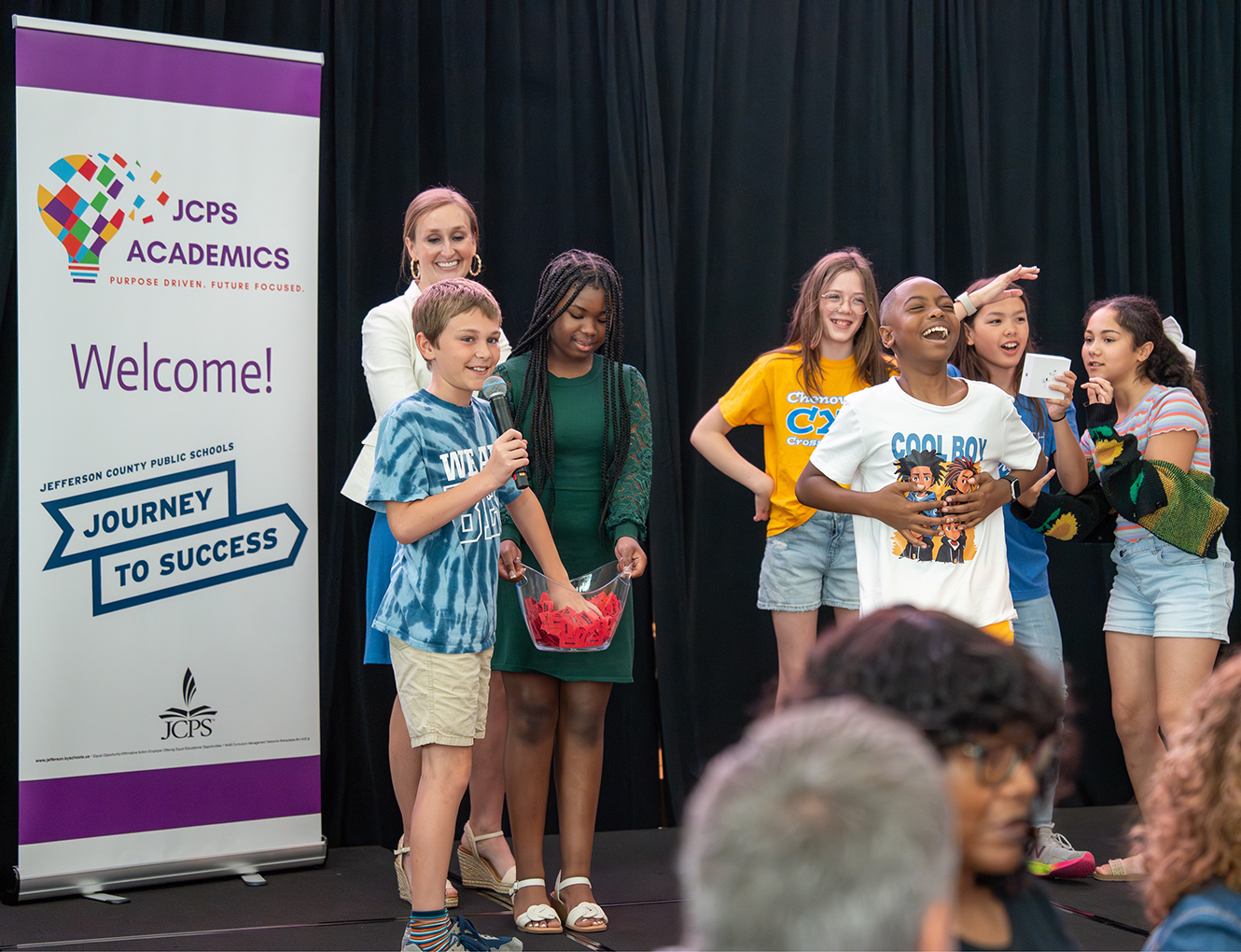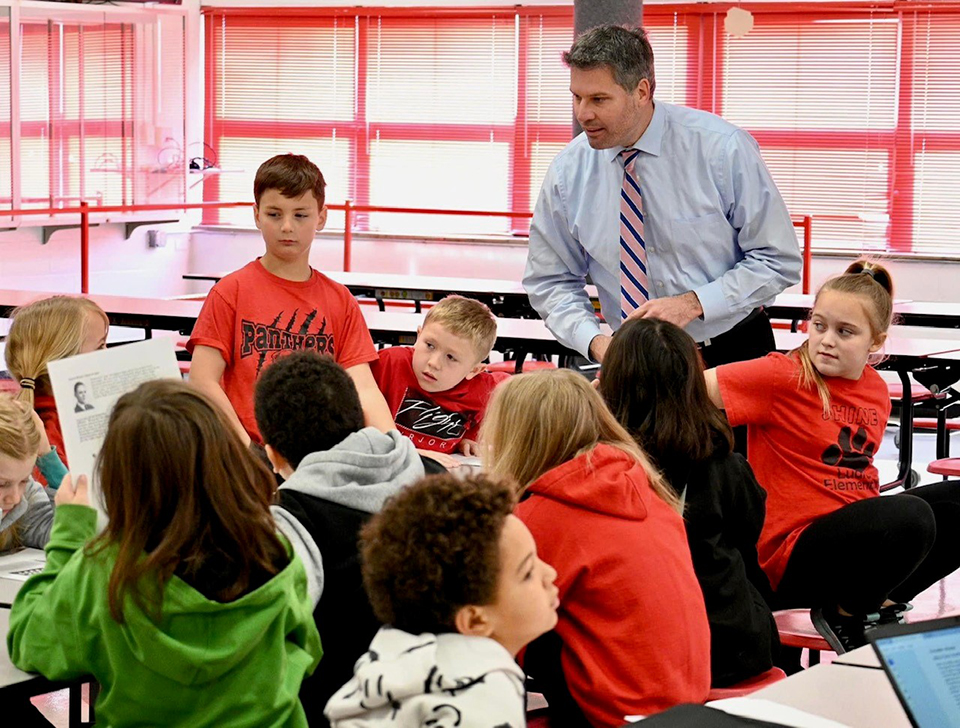
Kentucky Education Commissioner joined leaders of Kentucky colleges of education on March 23, 2022 to discuss the future state of education in Kentucky and how they can include the United We Learn vision in their programs. Photo by Jacqueline Thompson.
Education Commissioner Jason E. Glass joined leaders from Kentucky Colleges of Education on March 23 to discuss how they can use the principles of the Kentucky Department of Education’s (KDE’s) United We Learn vision for the future of public education in their education preparation programs.
Glass told the group that after working in several different states trying to improve such things as standards, content, measures, tests and accountability, he had a realization that existing approaches were not working.
“Coming to Kentucky, I think there was this recognition that … the world is changing and it’s getting faster, and that’s not slowing down,” said Glass. “The educational experiences that our kids are getting … are still not up to the pace that we need if we’re going to prepare our kids for the interconnected, fast-moving automated world that is already here.”
Before developing the United We Learn vision, Glass held listening tours across the Commonwealth in order to spark conversations around what improvements needed to be made to Kentucky’s education system. About 1,200 people from all regions of the state participated in the listening tour, with students facilitating each conversation. An empathy interviewing approach was used to draw out participants’ stories and experiences.
“Instead of asking, ‘How do we improve the teaching profession?’ we asked a question like ‘Tell us a story of a great teacher you had in your life,’” said Glass.
KDE then formed the Kentucky Coalition for Advancing Education (KCAE), a group that sorted through the data recorded from the empathy interviews and developed the United We Learn report. This detailed report calls for “bold and meaningful change” to Kentucky’s education system and identifies the current state and future vision for education in Kentucky based on what was learned through these conversations with parents, teachers, students, community members and other education stakeholders across the Commonwealth.
While the full United We Learn report is detailed and lengthy, Glass said there are three main themes for the United We Learn vision. The first is creating a more vibrant experience for every student by shifting their experience to make it more hands-on, more experiential, more connected to careers and the workforce, and more connected to their communities.

Kentucky Education Commissioner joined leaders of Kentucky colleges of education on March 23, 2022 to discuss the future state of education in Kentucky and how they can include the United We Learn vision in their programs. Photo by Jacqueline Thompson.
“What if we’d spent the last 30 years thinking about how we create meaningful learning experiences for students? Where would we be now?” asked Glass. “The exciting part is, now we get to for the next 30 years.”
The second theme Glass identified is focusing on innovation, particularly when it comes to the state’s assessment system. The report identified the artificial testing environment created by machine-scored assessments as a barrier to positive changes in learning.
The third theme stresses the importance of creating a bold new future for Kentucky’s schools through collaboration with communities.
“These are Kentuckians and what they are telling us they want for their future in the state, and they want to be involved in that effort going forward,” said Glass. “As we grow, as we think about a vibrant learning experience for every student, as we think about innovation, we need to do that with Kentuckians, with our students, with the people in our communities.”
One of the ways the United We Learn vision already is being implemented is through Kentucky’s Innovative Learning Network with 20 school districts serving as Local Laboratories of Learning (L3s). The L3s are engaging in a collaborative improvement process in their communities, with some already piloting new assessment processes and ideas to reimagine the student experience through equitable and deeper learning opportunities.
Glass also said there is currently a $28 million investment in Kentucky’s educational cooperative system to develop a network of deeper learning efforts across the state. PBL Works, an organization that works to build the capacity of teachers to design and facilitate quality project based learning, also is coming into the state over the next few years to provide trainings and support to teachers around problem- and project-based tasks, with the goal of reaching about one-third of the educators in Kentucky.
KDE and the KCAE also are working to engage legislators to include United We Learn goals within policy changes.
“Part of this effort going forward is to shift our policymakers and those in positions of power to see that the only thing that matters is did we change the experience of the student,” said Glass. “If your policies don’t do that, then it’s not really different.”
Glass also told the group of higher education leaders he is excited to talk about how Kentucky’s colleges of education and educator preparation programs can fit into the United We Learn initiative and how they can support it.
“If you’re an educator at heart, this kind of work should get you really excited,” said Glass.



Leave A Comment